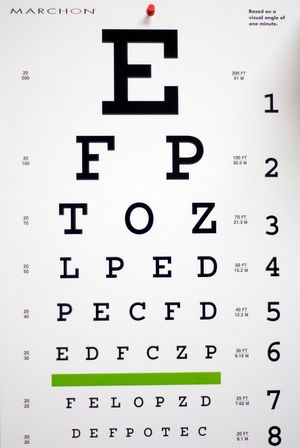See Clearly Check Yearly
Regardless of your age, or physical health, it is important to have regular eye exams. Comprehensive eye exams are a vital part of maintaining good eye health and vision. During the complete eye exam, our doctors will not only determine your prescription for eyeglasses or contact lenses, but also check your eyes for common eye diseases, assess how your eyes work together as a team and evaluate your eyes as an indicator of your overall health.
WHAT HAPPENS DURING MY EXAM?
Our top priority is ensuring your eye exams are thorough and all your visual needs are met.
We will start by discussing any relevant information, including any family history of ocular diseases, and any medications you are currently taking. We will also take a look at your current spectacles and/or contact lenses if you wear them.
Next we will test your visual acuity, using a standard Snellen chart and then determine the correct prescription using a phoropter (this is where the famous better 1 or 2 comes into play). We assess your pupil reflexes, peripheral vision, and how your eyes move together as a team. We will assess your intraocular pressure (screening test for glaucoma), retina and optic nerve, and look for other ocular diseases such as cataracts, age related macular degeneration, glaucoma, retinal diseases. Your eyes are often a good indicator to your overall health; such as high blood pressure, cholesterol and diabetes.

The Ontario Association of Optometrist recommends yearly eye exams or as recommended by your doctor of optometry, depending on your age, risk factors and physical conditions.
If you have diabetes, or high blood pressure, or a family history of eye diseases, is it recommended that you visit your optometrist annually. From there, our doctors can assess your situation and provide you with an appropriate treatment plan.
If you are over 40 years of age, it is a good idea to have your eyes examined every one to two years to check for common age-related problems, such as presbyopia, cataracts, and macular degeneration.
Because the risk of eye diseases continues to increase with advancing age, everyone over the age of 60 should be examined at lease annually to help maintain your vision. Normal vision development in patients over the age of 60 often involves eyesight deterioration. as well as the difficulty adjusting to light and dark.
Read more about Vision After 40.
Read more about Vision After 60.
PEDIATRIC EYE EXAMS
Experts estimate that approximately 5 to 10% of preschoolers and 25% of school age children have vision problems. According to the Ontario Association of Optometrist, all children should have their eyes examined at 6 months of age, at age 3 and again at the start of school. Yearly eye exams for kids are important to ensure their maximum learning potential. Afterall, 80% of learning is visual!

Children with existing vision problems or risk factors should have their eyes examined more frequently. Common risk factors for vision problems include:
- premature birth
- developmental delays
- turned/crossed eyes
- family history of eye disease
- history of eye injury
- other physical illness or disease
Read more about Pediatric Eye Exams.
Schedule an appointment for an eye exam today with your eye doctor in Whitby!



